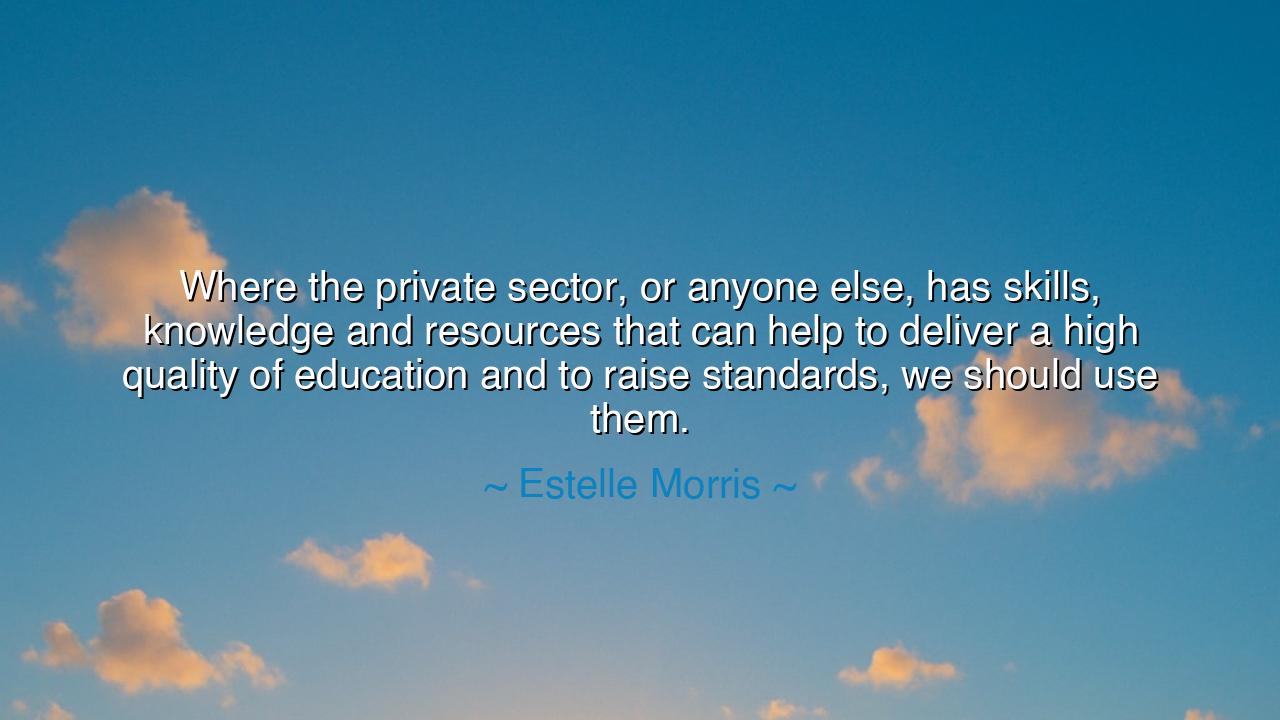
Where the private sector, or anyone else, has skills, knowledge
Where the private sector, or anyone else, has skills, knowledge and resources that can help to deliver a high quality of education and to raise standards, we should use them.






“Where the private sector, or anyone else, has skills, knowledge and resources that can help to deliver a high quality of education and to raise standards, we should use them.”
So spoke Estelle Morris, a champion of learning and former Minister for Education in Britain. Her words, though rooted in policy, rise beyond politics — they are a timeless call to unity in purpose, to the joining of minds and hands in the sacred labor of education. For the teaching of the young, the shaping of human souls, is not the duty of one class or one realm alone; it is the responsibility of all who hold wisdom, skill, or resource to nurture the next generation. In this truth lies both humility and greatness — humility to seek help, and greatness to use it well.
The heart of this saying lies in the recognition that knowledge is not the possession of one. The tree of learning grows not in the garden of the scholar alone, but in the fields of the craftsman, the workshops of the engineer, the studios of the artist, and the halls of the innovator. The private sector, though born of enterprise and commerce, carries in its breast the fires of creativity, discipline, and progress. To ignore its light in the realm of education is to dim the flame of collective wisdom. Estelle Morris’s words remind us that education is strongest when all corners of society give their gifts to it.
There was a time, in the days of the Renaissance, when such unity of purpose gave birth to an age of miracles. The patrons of Florence, merchants and bankers, lent their wealth to the artists and scholars who would illuminate the world. The Medici family, though men of trade, saw that beauty and intellect could not flourish without support. Their partnership with thinkers like Leonardo da Vinci and Michelangelo did not merely fund art — it raised the standards of civilization itself. The private and public spirits became as two wings of the same bird, lifting humanity toward enlightenment. Such is the living embodiment of Morris’s wisdom.
To raise standards is not only to improve the structures of schools or the quality of instruction; it is to awaken excellence in the hearts of students. When skills and resources from every sector are united in purpose, the barriers between wealth and learning, industry and intellect, dissolve. The factory that shares its innovation with the classroom, the business that funds the library, the scientist who mentors the child — these acts are not charity; they are investments in the soul of society. For when one generation teaches the next, the torch of progress burns ever brighter.
But to heed this wisdom requires courage and humility. Too often, pride divides us — the teacher believes the merchant cannot teach; the innovator scorns the academic; the government hesitates to trust the private hand. Yet, as in all things, isolation leads to weakness. The river of knowledge flows strongest when fed by many streams. If we are to deliver a high quality of education, we must open our doors, not close them; we must invite the skilled, the creative, and the visionary to lend their strength. In partnership lies the power to transform.
Consider also the example of Malala Yousafzai’s movement for education. When her cause grew beyond her homeland, it was supported not only by teachers and activists, but by private donors, corporations, and foundations across the world. Their combined efforts built schools, trained teachers, and opened the doors of learning to thousands of girls. This harmony of purpose — government, private sector, and individual hearts — proved that when resources unite under a noble aim, the impossible becomes possible. Malala’s story breathes new life into Estelle Morris’s call: that everyone’s gifts can and must serve the cause of learning.
The lesson, then, is this: education is the shared labor of humanity. It is not confined to the walls of classrooms nor the books of scholars. It is built through the hands of workers, the vision of entrepreneurs, the wisdom of elders, and the dreams of the young. Let no one say, “This is not my work,” for every craftsman, every thinker, every soul has a part to play in the teaching of the world. The wise society is not the one that hoards its talent, but the one that shares it freely, for the benefit of all.
So, O seekers of the future, take heed of this counsel: when you have knowledge, share it; when you possess skill, teach it; when you hold resources, use them for good. Join hands across all boundaries — public and private, rich and poor, teacher and tradesman — for only together can we build an education that is worthy of our children. To involve all in the raising of standards is to build not just schools, but a civilization that endures. And when we do so, we fulfill the deepest dream of Estelle Morris’s wisdom: that the greatness of learning belongs to all who dare to build it.






AAdministratorAdministrator
Welcome, honored guests. Please leave a comment, we will respond soon